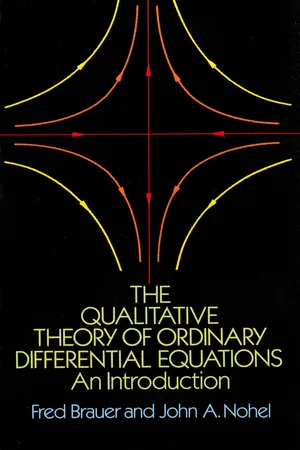
The Qualitative Theory of Ordinary Differential Equations
An Introduction
- 320 pages
- English
- ePUB (mobile friendly)
- Available on iOS & Android
About this book
"This is a very good book ... with many well-chosen examples and illustrations." — American Mathematical Monthly
This highly regarded text presents a self-contained introduction to some important aspects of modern qualitative theory for ordinary differential equations. It is accessible to any student of physical sciences, mathematics or engineering who has a good knowledge of calculus and of the elements of linear algebra. In addition, algebraic results are stated as needed; the less familiar ones are proved either in the text or in appendixes.
The topics covered in the first three chapters are the standard theorems concerning linear systems, existence and uniqueness of solutions, and dependence on parameters. The next three chapters, the heart of the book, deal with stability theory and some applications, such as oscillation phenomena, self-excited oscillations and the regulator problem of Lurie.
One of the special features of this work is its abundance of exercises-routine computations, completions of mathematical arguments, extensions of theorems and applications to physical problems. Moreover, they are found in the body of the text where they naturally occur, offering students substantial aid in understanding the ideas and concepts discussed. The level is intended for students ranging from juniors to first-year graduate students in mathematics, physics or engineering; however, the book is also ideal for a one-semester undergraduate course in ordinary differential equations, or for engineers in need of a course in state space methods.
Frequently asked questions
- Essential is ideal for learners and professionals who enjoy exploring a wide range of subjects. Access the Essential Library with 800,000+ trusted titles and best-sellers across business, personal growth, and the humanities. Includes unlimited reading time and Standard Read Aloud voice.
- Complete: Perfect for advanced learners and researchers needing full, unrestricted access. Unlock 1.4M+ books across hundreds of subjects, including academic and specialized titles. The Complete Plan also includes advanced features like Premium Read Aloud and Research Assistant.
Please note we cannot support devices running on iOS 13 and Android 7 or earlier. Learn more about using the app.
Information
Table of contents
- Cover
- Title Page
- Copyright Page
- Preface
- Contents
- Chapter 1 Systems of Differential Equations
- Chapter 2 Linear Systems, with an Introduction to Phase Space Analysis
- Chapter 3 Existence Theory
- Chapter 4 Stability of Linear and Almost Linear Systems
- Chapter 5 Lyapunov’s Second Method
- Chapter 6 Some Applications
- Appendix 1 Generalized Eigenvectors, Invariant Subspaces, and Canonical Forms of Matrices
- Appendix 2 Canonical Forms of 2 × 2 Matrices
- Appendix 3 The Logarithm of a Matrix
- Appendix 4 Some Results from Matrix Theory
- Bibliography
- Index